Spotlights in the bathroom
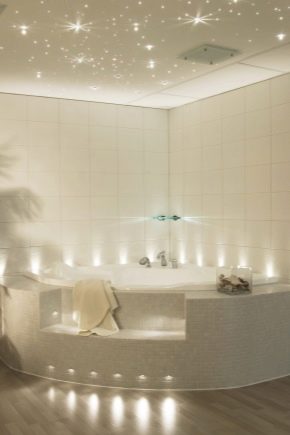
When planning a bathroom renovation, many are faced with a difficult choice of artificial lighting in the complete absence of natural light. In the modern market for various electrical appliances, spotlights are becoming increasingly popular, because, due to their unique characteristics, they are able to simultaneously perform several significant functions, as well as meet important parameters: compactness, brightness, moisture resistance.
What are they?
Spotlights are small-sized devices (fluorescent or halogen lamps), which, thanks to their special frame, are mounted in false ceilings, allowing for sufficient luminous flux to illuminate the bathroom. A specially equipped housing protects the built-in lamps as much as possible from moisture and significantly reduces the risk of a short circuit. Thanks to their design, these sources give the interior a harmonious, aesthetic look.
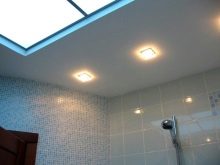
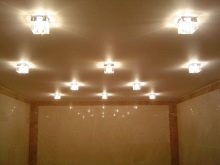
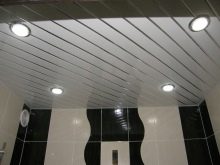
Products from a number of countries are especially popular: Germany, Great Britain, Italy, Spain. These are mainly halogen lamps. Domestic manufacturers prefer models with conventional incandescent lamps, which, while not very different in design, are much lower in cost.
Which ones to choose and how to replace?
Advantages of halogen lamps:
- acceptable price;
- high light output;
- long-term operation.
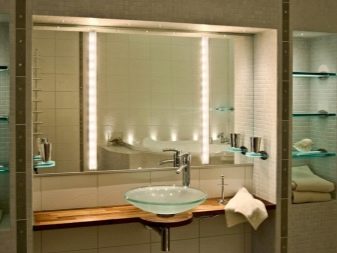
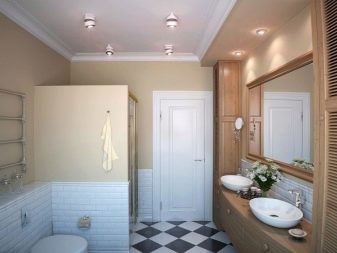
Due to the release of a large amount of heat, the installation of these devices is used only in stretch and suspended ceilings.
LED samples (called LEDs) based on light emitting diodes.
At the moment, these are one of the most common types that have a number of advantages:
- long-term operation (up to 50,000 operating hours);
- high luminous efficiency;
- exude white lighting, which has a beneficial effect on vision;
- low power consumption.
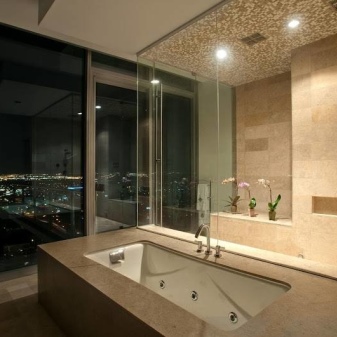
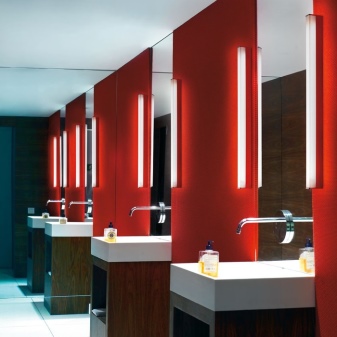
But these undoubted advantages cannot hide some disadvantages:
- high cost (4-5 times more expensive than similar models with other light sources);
- difficult installation solely through a transformer.
Despite the disadvantages, these samples are in great demand nowadays, because they have many modifications of sockets both for standard bulbs (E27) and for other types (E14, the so-called minions G4, G5. G9).
Incandescent lamps. This type also received its buyers who prefer a low price, practicality and ease of use. Consumers use a stereotype that has developed over a long time of using just such electrical appliances and has become a kind of habit.
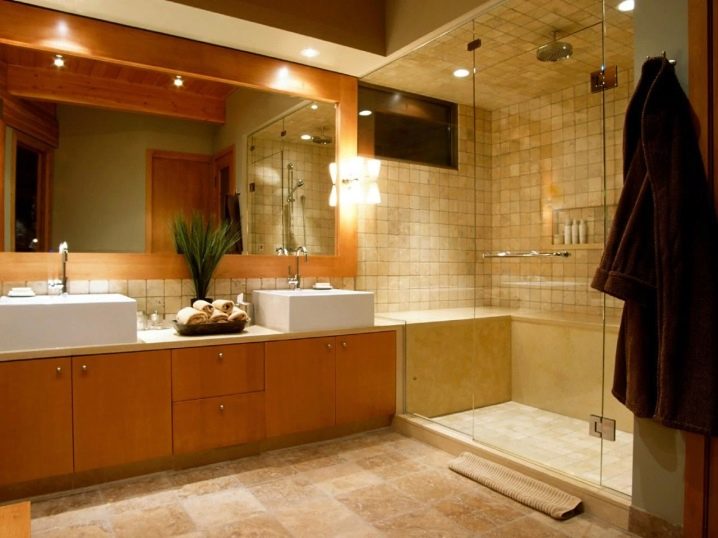
But do not lose sight of the disadvantages present:
- small resource;
- short service life.
External characteristics are also very important when choosing lamps for the bathroom. In any specialized store, you can choose a model for every taste and color, which will be in harmony with any interior.
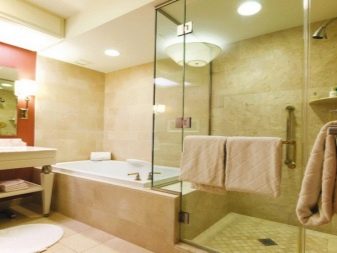
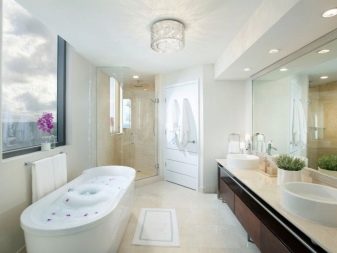
It is imperative to use special waterproof lamps in the bathroom.
Not every customer will be able to distinguish a standard device from a moisture resistant one at a glance. The special marking of the goods with the letters IP indicates the protection against moisture of the electrical device.And the numbers that follow show the degree of protection (IP44 - from accidental splashes, IP55 - from direct splashes of water) - the higher the IP index, the safer the electrical appliance. In such luminaires, the connection holes and the gap between the glass and the lamp itself are equipped with reliable rubber gaskets.
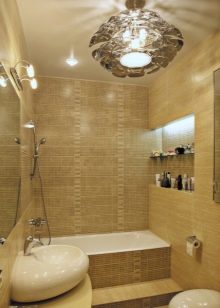
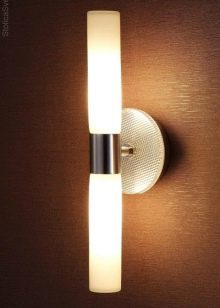
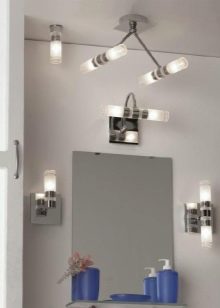
Moisture resistant devices are performed as follows:
- completely buried in the ceiling;
- protrude down;
- have the shape of a plafond;
- can combine decorative details and color design.
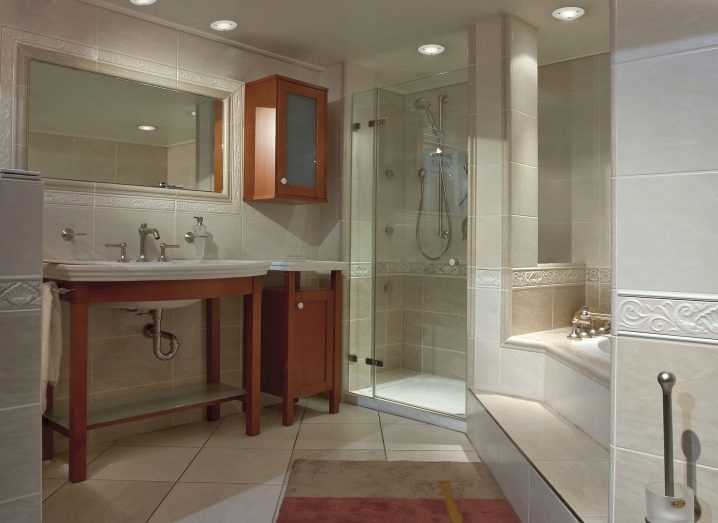
A source protruding above the ceiling gives more light, reflecting from the lamp to the ceiling, rushes down.
How to make the installation of spotlights yourself, see the next video.
Can I change the lamp in the appliance myself?
For spot lighting, as a rule, two types of caps are used:
- with normal right-hand thread for standard chuck. Replacing such a light bulb will not be difficult;
- lamps with a G type base and its modifications, which for fastening have two pins, guides and fixing the installation. Do not use force when replacing such an assembly. When the pins are in the groove, a characteristic click will easily occur, indicating that a snap has occurred. If this does not happen, do not try to press, try again, pulling out the element that most likely did not fit into the groove.
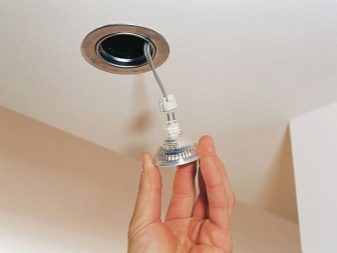
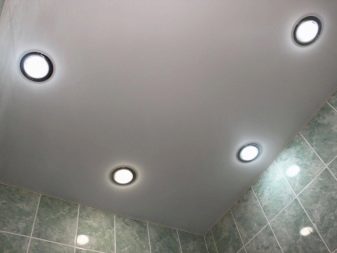
There are other sources for which it is impossible to replace the lamp built into the luminaire itself. In case of failure, you will have to change the entire lighting fixture. And for this, it is better to contact a specialist in the installation of these types.
Varieties
Lighting devices are divided into types according to similar principles:
- By installation method: internal (or built-in) and external (or overhead, otherwise spots). Built-in (they have a metal case with fixing elements for the lamp) are mounted on any surface under which there is free space: stretch or suspended ceilings, plasterboard structures, walls, cabinets. LED diode lamps are usually used.
Overhead or spots (they have an attachment platform to which the light body is attached) are placed on solid ceilings or concrete slabs, where it is not possible to make recesses for installing internal models. They are designed to illuminate a specific area of the room and have a directional luminous flux. Usually they are installed in front of the mirror.
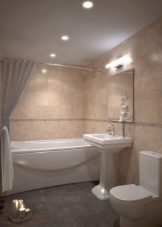
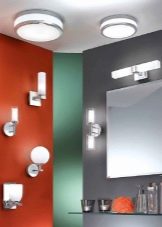
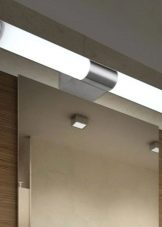
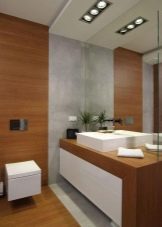
- By location: ceiling, floor, wall. Ceiling models are especially common in modern bathrooms. Located at a fairly high altitude, they are as safe to use as possible. They can be equipped with a movable mechanism (swivel) for self-selection of the direction of illumination. The latest designs allow some of the models to be integrated into the flooring, creating a unique effect, especially in floors with 3D decoration.
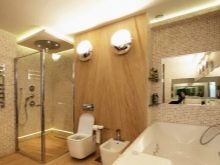
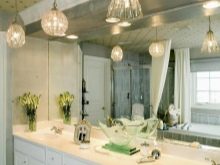
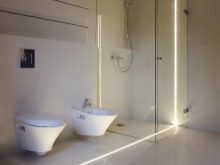
- On the use of different types of bulbs within a certain model (as discussed in detail above).
- By materialfrom which they are made: glass, crystal, cast, stamped. Experts for installation in PVC stretch ceilings (limiting the power of a 35 W halogen lamp) recommend choosing stamped ones, because they have a place for inserting a special thermal ring, which practically does not heat up. But it will be noticeable when installing cast samples, which will significantly spoil the aesthetic perception.
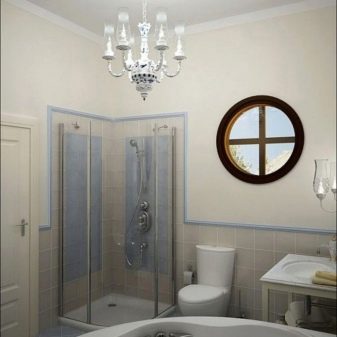
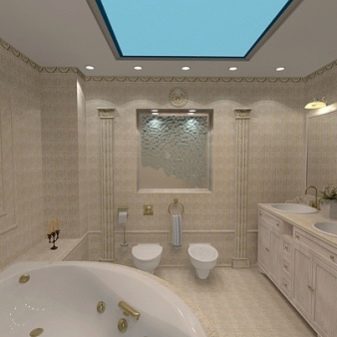
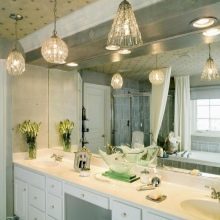
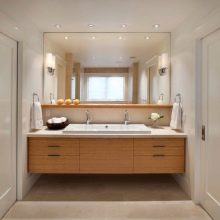
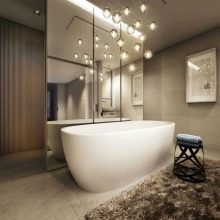
- By device type: swivel (allow you to change the direction of light by turning a special bell) and fixed or non-swivel (which are firmly attached to the ceiling and their stream of light is directed to one place).
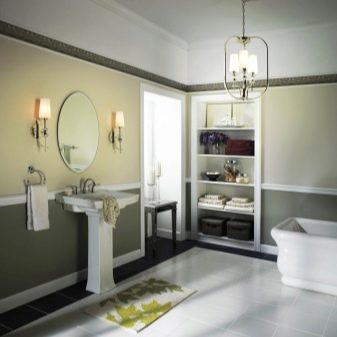
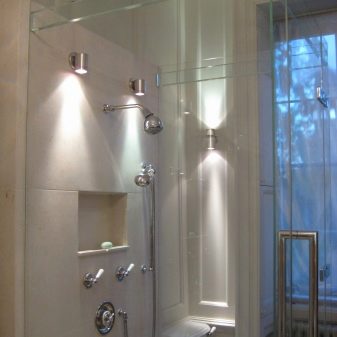
Separately, I would like to note the dimmed (or dimmable) LED lamps, which allow you to change the strength of the luminous flux through the use of an additional built-in unit (dimmer).With the help of a dimmer, the illumination can be varied from ten to one hundred percent.
Such sources allow you to create coziness and an unusual atmosphere in the house.
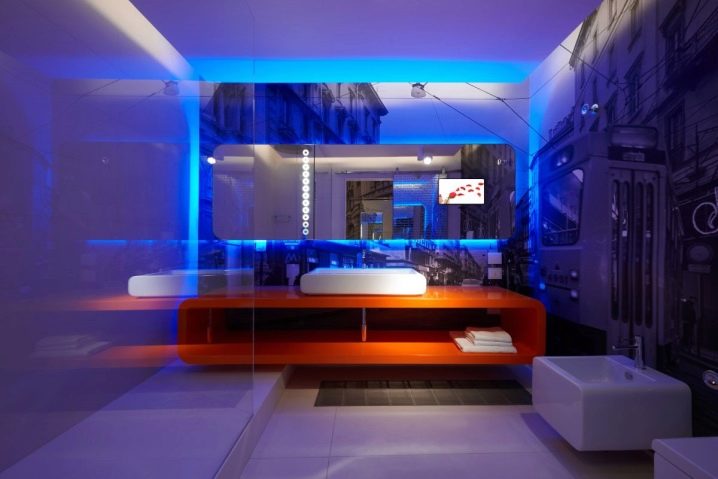
The only drawback of these designs is the rather high price, so how practical it will be to purchase such an option is up to you.
Appointment
Wall options
In addition to the widely used ceiling lighting, recently, single wall lamps in the form of a sconce have become more common. They contain few bulbs, but at the same time they serve as a decor and look great, accentuating our view on a spectacular decoration. A fairly large ball-shaped shade, which is securely attached to the wall with screws, is also suitable as a wall model. The main thing is that it fits the design and has sufficient brightness.
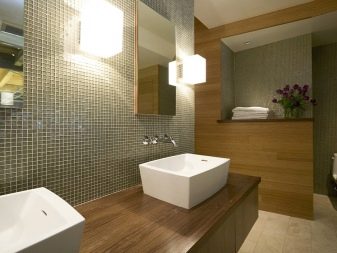
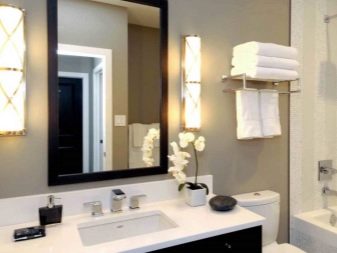
The mirror in the bathroom plays an important role, and therefore requires a separate lighting. And here the most convenient option will be the wall option, which can be in the form of several built-in spotlights or an LED strip running around the perimeter.
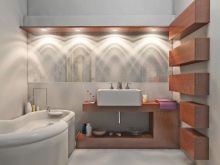
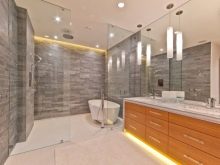
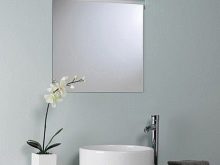
Ideas for Khrushchev
Even a small bathroom in "Khrushchev" will sparkle with new colors with optimally selected lamps that will create a certain visual illusion, expand the room and hide flaws or accentuate the highlights of the interior.
Bright lighting can push the walls apart, and designers advise using dimmable LED lights that can adjust the luminous flux.
In the morning they can be turned on at maximum brightness to help the body wake up, and in the evening they can be turned on to reduce the intensity of the lighting to prepare for evening rest and sleep.
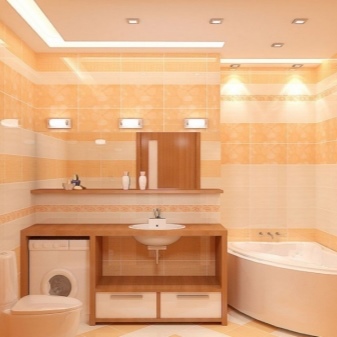
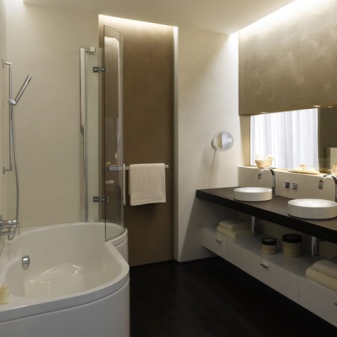
In a small bathroom, the functional areas are highlighted with light:
- the easiest way is to emphasize each subject;
- highlight a specific object with a beam of light that is collected from different places;
- illuminate different areas with colored lights. This can be achieved by installing several lamps of different colors on the ceiling, and directing them to the right place;
- apply two-position sources for different zones (the color of the lamps may not match).
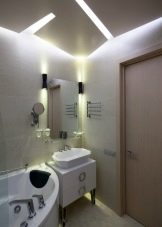
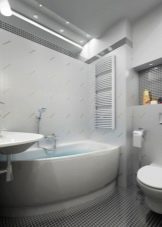
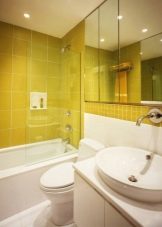
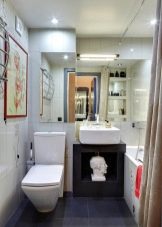
Correct mirror lighting will also help to beat a small bathroom section:
- choose uniform lighting with several horizontally placed luminaires at a height of about 1.5 - 2 meters;
- frame a small mirror with two symmetrical lamps, which evenly distribute the light without shadow transitions;
- lay the lighting fixtures along the contour of the accessory;
- lamps can be mounted both on the wall and on the glass itself using special glue.
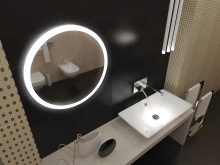
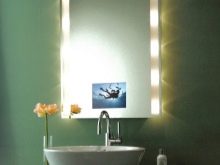
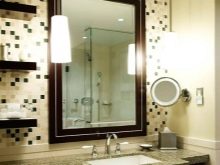
Styles
Each of us dreams that the home, and in particular the bathroom, looks modern and well-groomed. It helps to get inner satisfaction, aesthetic pleasure, disposes to positive, helps to stay in a great mood:
- The most popular is considered classic style design, which implies restraint, elegance and a certain simplicity. Here, laconic versions of lamps without excessive decor are acceptable, which can accentuate the beauty and elegance of the interior.
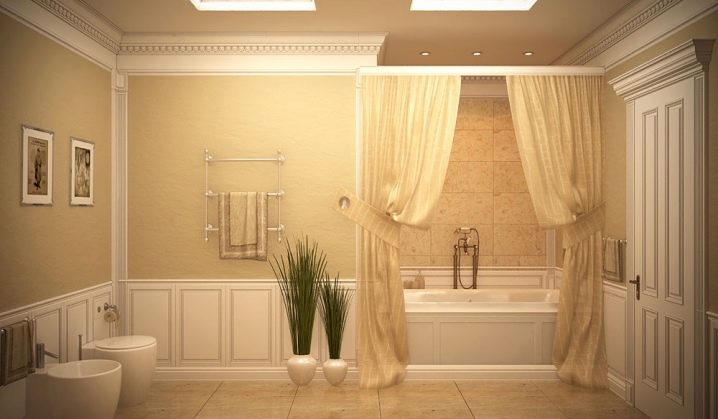
- Another attractive bathroom option can be styled Hіgh-tech (hi-tech)... Lamps in this direction are made of glass, plastic, they can have many metal elements and a shiny surface that will emphasize the style favorably. But at the same time, the abundance of creative decor is also not typical. In shape, they can be round, in the form of a trapezoid and other shapes.
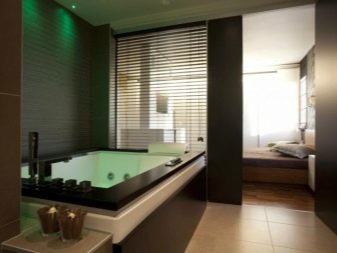
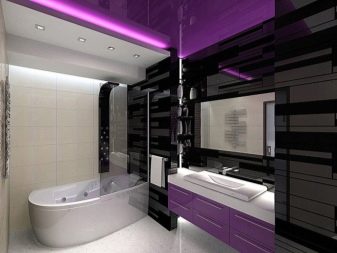
LED strips are a newfangled acquisition. This design will be appreciated not only by young people, but also by their contemporaries of the older generation, who are able to appreciate simplicity, grace and elegance.
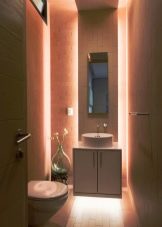
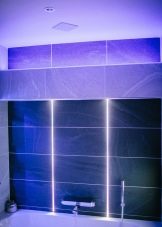
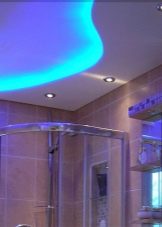
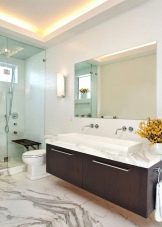
- The most fashionable direction of the 20s-30s of the last century is art deco style very popular today. Its motto is geometry without asceticism.Geometric shapes of regular shape are typical: a ball, a cube, an octahedron (or octahedron). Often, such lamps are associated with the temples of the ancient Aztecs and with the pyramids of the Egyptians. They are usually installed in expensive hotels, luxurious mansions, and elite restaurants.
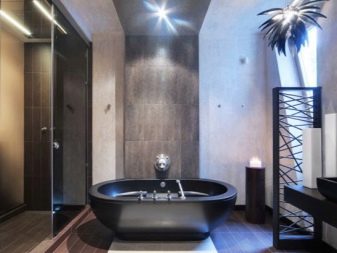
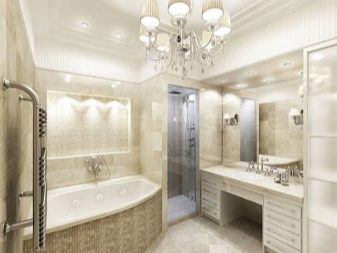
- The most striking direction in design can be safely called modern (or art nouveau)... The style is characterized by expensive materials (quartz, marble, leather, natural wood, glass) and very smooth and curved lines. Sometimes they use semi-precious stones and inlay. Each model is considered an exclusive handicraft because it is ideally made to order and is not intended for mass production.
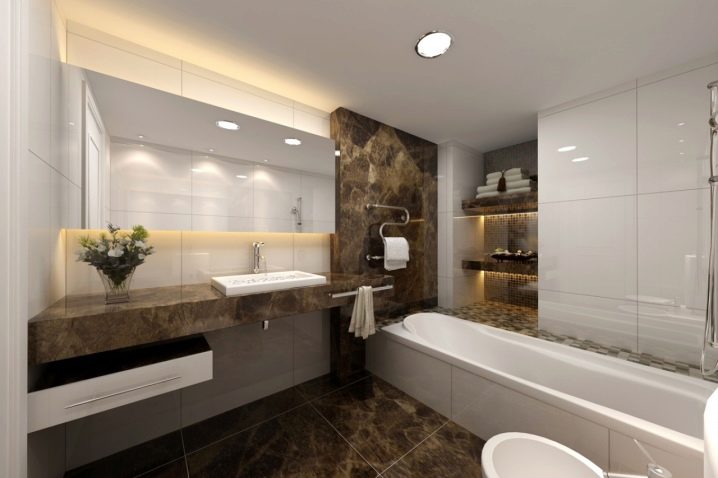
- Style bionics is based on the word "bio" and embodies harmony with nature. The shapes are also borrowed from the environment: sea shells, images of leaves, honeycombs of bees, the semblance of insects.
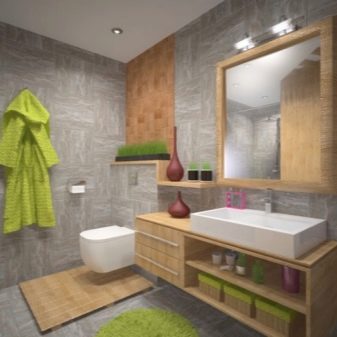
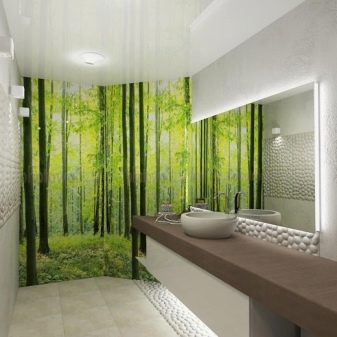
- Style deconstructivism as if casts doubt on the laws of physics and ordinary forms, and will be of interest to connoisseurs of virtual reality and computer technology. Emphasis is placed on illumination, creating optical illusions. LED strip is widely used.
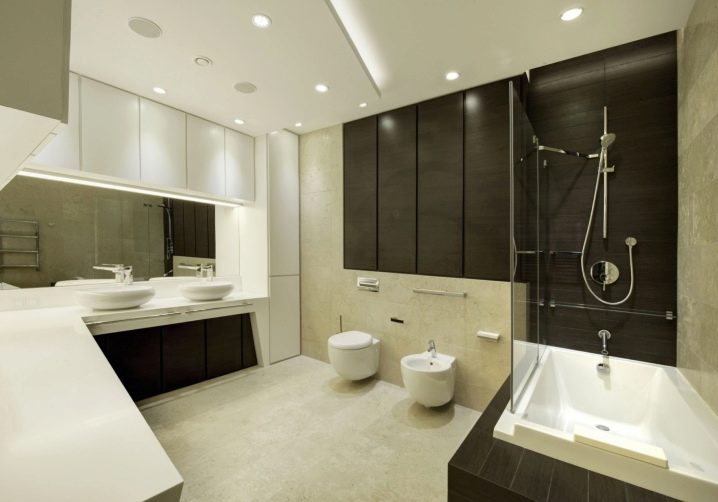
- Minimalism does not imply unnecessary decorations and color variety. Gray and white are the main shades of this trend. Luminaires should look very simple and light, therefore they have a simple geometric shape and are often made of glass.
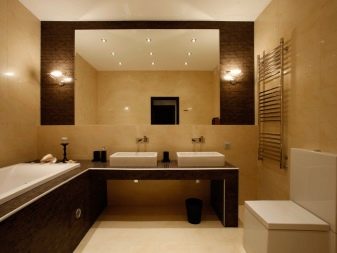
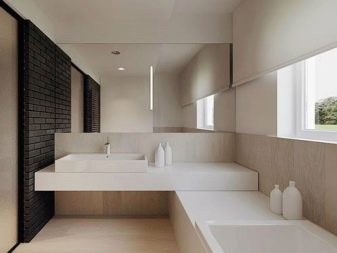
- Irony style appeared at the end of the last century. Lightheadedness and humor appeared in interior designs. Today, recessed luminaires in this direction will ideally fit into a children's room or bathroom.
- For style neoclassicism characterized by luxury and solidity, which implies the presence of expensive materials: crystal, shiny chrome elements. Smooth lines and shapes are inherent in this direction.
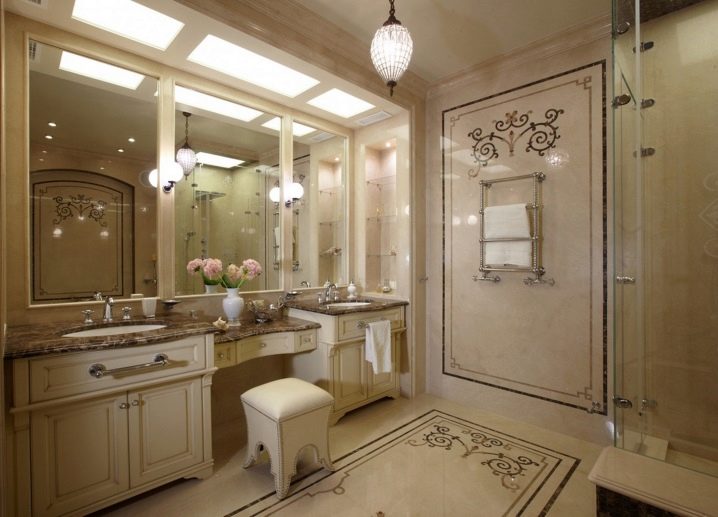
- Eclecticism - one of the most popular in Russia, where they often do not adhere to any one direction. It means mixing several styles at once, not limited to imagination: bronze lamps, illuminated by LED strip, can look good in a modern bathroom.
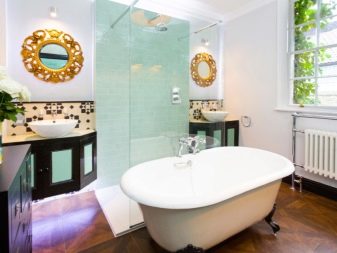
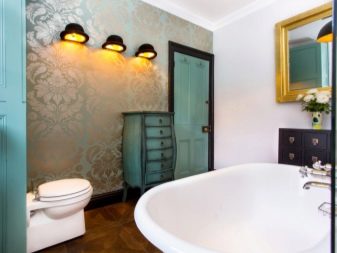
This is not a complete list of all design options, because the division of spotlights into styles is very arbitrary, since it is very difficult to determine the boundaries of one or the other direction.
Options for the location of lamps in the interior
When you have decided on the type of lamp and the type of lamp, the question arises: how best to arrange the light sources, and how many are needed for a given room? Correct placement is very important.
Must be taken into account:
- the area of the room (for a small bathroom, not so many lamps will be required as for a hall or living room);
- zonal distribution;
- if there are windows, then their number and location;
- space design (in the room and in the bathroom, the lamps will be located in a completely different way).
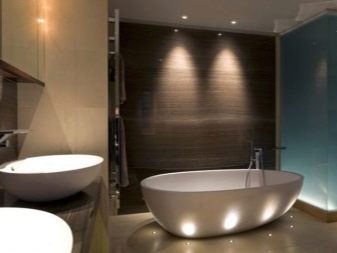
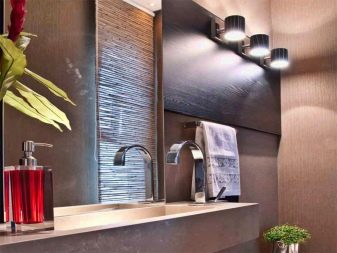
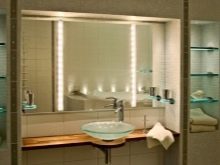
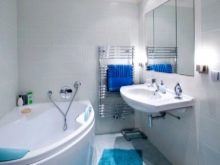
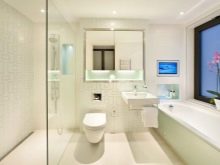
Considering that one point device is designed to illuminate 2 square meters. m, then into a room with an area of 20 sq. m of them will be required ten, and for a bathroom of 4 sq. m - only two.
But these are only approximate calculations for orientation. If you install more lighting fixtures, it will only get better, because they do not blind your eyes like chandeliers.
The most popular locations are:
- A circle, or two semicircles.
- Oval.
- Crosswise.
- Rectangle.
- Arc (or arch).
- Wave.
- Triangle.
- Star.
- Chaotic.
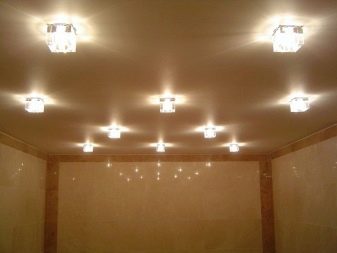
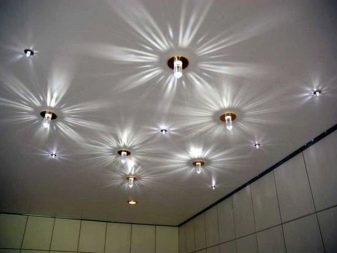
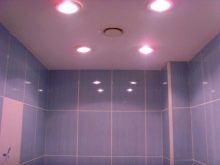
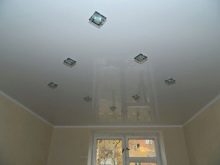
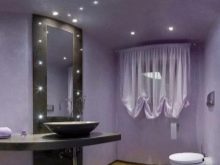
Everything is at the mercy of your taste and harmony with the interior design.













The comment was sent successfully.